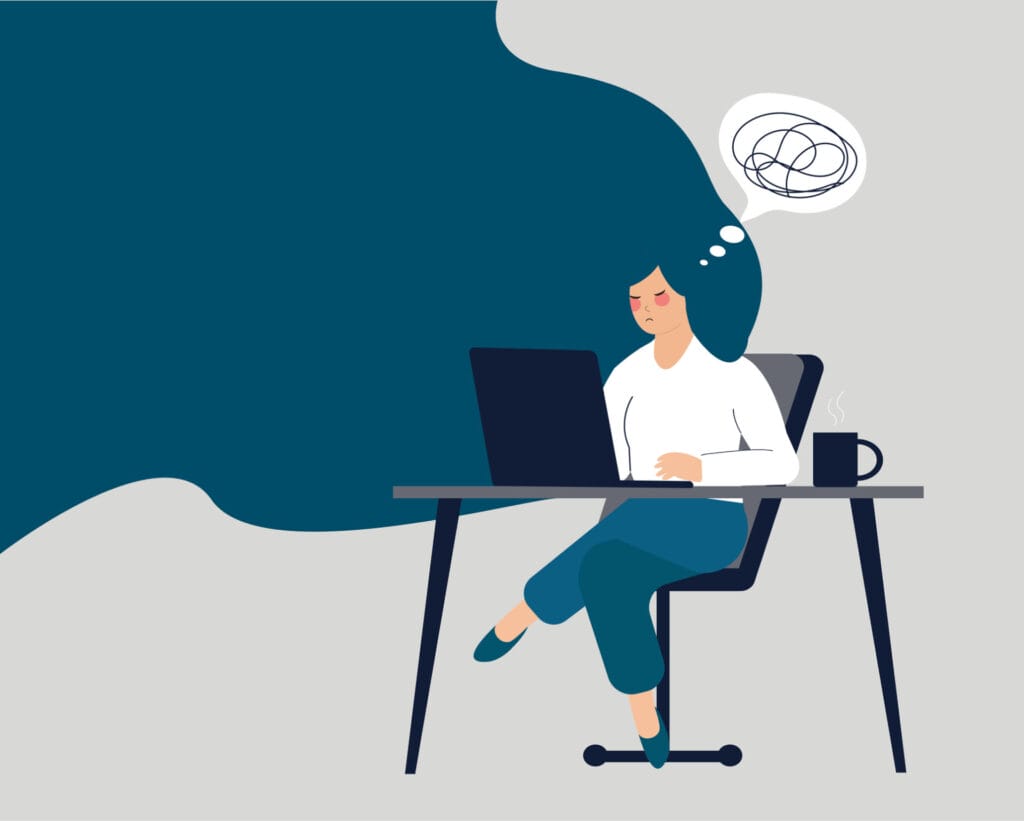In April, we published a blog post on how to recognize and manage everyday stress, listing symptoms and tips one could follow to live a happier and more relaxed life. Today, we’re doing a deeper dive into stress management for healthcare staff, and how our Arize behavioral health EHR platform can help mitigate burnout for both the clinical and administrative teams.
Healthcare workers are accustomed to working in high-pressure environments, but between COVID-19, staff shortages, late nights, and longer shifts, the stress clinicians face daily has reached a breaking point. Technology, such as EHRs, is meant to help clinicians complete tasks. However, according to a 2019 survey, clinical process design and structure, both of which are highly impacted by EHR’s, contributed to approximately 40% of clinician stress.1. Fortunately, it does not have to be this way. Here are seven issues that often cause problems for clinical staff, and how Cantata’s Arize EHR help resolve them.
- Overwhelming workload
Working in healthcare can be overwhelming at times, especially when you know you have a long task list ahead of you, or are seeing many patients that day. One of Arize’s most unique and appealing features is its fully customizable dashboard with real-time views of patient data. Each provider can set up the information they want to see immediately upon login, including their patient roster, upcoming appointments and tasks, medication lists, their calendar or inbox, and much more. It’s always better to know what you’re getting into, and this feature helps clinicians get a clear, unified view of how their day looks. The Arize dashboard serves as a critical focal point for staff on all levels, enabling them to monitor key performance indicators (KPI’s), outcome measures and the drivers behind them. Organizations will see an increase in staff productivity quickly and easily begin using standard or custom home pages and dashboards.
- Surfing the system
Your practice or facility may hold hundreds of patients’ clinical records with thousands of test results, insurance forms, etc., making it challenging to find the data you need. Arize’s Global Search functions like the search engines we use everyday– users can type in any term and immediately find and view any record, treatment plan, assessment, progress note, report, etc., where that term appears. The search provides instant identification of words, numbers, or phrases contained in any stored chart area in the database.
- Using Data for Accurate Treatment
Without easy access to accurate and complete information, patient care can slip into a one-size-fits-all model that can be inefficient, expensive, and reactive. Timely, accurate data is crucial when prescribing medication and developing treatment plans. Not knowing or not being confident about your patient’s background or medical history can cause clinicians to struggle with this. In Arize, each patient has a profile in which all demographic information is stored, such as name, birthday, gender, social security number, address, phone number, emergency contacts, allergies, vital signs, medications, medical conditions (physical and mental), aliases, and much more. By having all this data available in one central location, providers have all the necessary information to safely and efficiently treat clients.
Providers can also run reports on user-defined fields to give them a more unified view of their patients, tracking trends and the progress an individual or a group has made. Reports are generated in real-time from existing EHR data. With Arize, clinicians do not have to stress over creating forms, because Arize comes pre-loaded with a library of standard reports that can be filtered, sorted, and grouped by user-preferred fields, including user, time-period, contact type, assessment/form type, flags, and select custom variables, such as episode, service type, etc. Users can also modify templates or create new ones from scratch if they would prefer. Custom templates can also be saved to decrease redundancy and save time in the future.
- Alert fatigue
Notifications from your EHR are essential for patient safety. Staff members need to know when vital signs significantly change, when medications need to be administered or refilled, if consents need to be signed, etc. However, too many notifications can lead to alert fatigue – when clinicians become desensitized to safety alerts and, as a result, ignore or fail to respond appropriately to such warnings.2 Ignoring alerts without thoroughly reading them can be detrimental to patient safety. Luckily, Arize allows its users to customize the alerts they receive.
Arize is designed around the principle of flexibility through user configuration. Alerts and prompts can be set up by administrators to support clinical errors and warnings (e.g., adverse events), upcoming scheduled appointments, pending/incomplete tasks, or to provide a clinical decision. These alerts can come right through the system or to one’s personal smartphone via email or text. This allows staff to access and handle tasks in Arize in a timely, user-friendly, and efficient manner, resulting in more positive patient outcomes.
- After hours note-taking
After a long shift, there is no better feeling than putting your pajamas on, kicking back on the couch with your favorite snack, and catching up on all your shows. Unfortunately, this is not a reality for many healthcare workers. Studies show the average clinician spends 1.4 hours (86 minutes) on their EHR after their shift has ended.3 While this may be difficult to avoid altogether, Arize makes logging notes at home much simpler, as its mobile-ready interface is designed for remote work. Providers can log on to their system through any Windows, MacOS, Chrome OS, iOS, or Android-based devices, including laptops, smartphones, and tablets. Setting up multi-factor authentication on remote devices ensures that all patient information is secure on any network.
- Scheduling appointments
It can be challenging to find a time that fits both your and your patient’s schedules. Clients should not have to wait five weeks for their next visit, and you shouldn’t have to stay in the office until 9 pm when the patient gets off work. Arize’s scheduling function allows clinicians to view their personal schedule and their patient’s schedules side-by-side to align their available times and avoid both overbooking and no-shows. Providers can also view the schedules of other staff, internal and external, and can search for appointments by patient, date, location, practitioner, and service type, with the ability to add fields such as duration of visit, whether a recurring or one-time visit, etc. Healthcare staff can schedule appointments, write documentation, and edit group notes from the calendar view.
- No-shows
Cancellations and no-shows could be the downfall of a practice or organization. In fact, as many as 30% of patients may not show up for their appointments, costing the industry billions of dollars each year between lost revenue and patient attrition.4 Not only does this hurt the bottom line, but it also irritates staff. Cantata’s Consumer Portal can be automated to send reminders to patients about upcoming appointments, medication reminders, when prescriptions need to be refilled or are ready to be picked up, when paperwork is due, etc.
Arize is one of the most exciting Electronic Health Record solutions to ever hit the market! It uses the most up-to-date technology and has the capabilities to meet the needs of healthcare workers in all roles and specialties. Its ease of use makes it a great tool for increasing staff satisfaction and improving clinical workflow. If you are looking for a better EHR, request a call to learn more about Arize!
. . . . . . . . . . . . . . . . . . . . . . . . . . . . . . . . . . . . . . . . . . . . . . . . . . . . . . . . . . . . . . . . . . . .
REFERENCES:
- “The Mental Health of Healthcare Workers in COVID-19.” Mental Health America, https://mhanational.org/mental-health-healthcare-workers-covid-19.
- Jason, Christopher. “Study Shows Physician Burnout Directly Related to EHRs.” EHRIntelligence, 26 Sept. 2019, https://ehrintelligence.com/news/study-shows-physician-burnout-directly-related-to-ehrs.
- “Alert Fatigue.” Patient Safety Network, 7 Sept. 2019, https://psnet.ahrq.gov/primer/alert-fatigue#:~:text=The%20term%20alert%20fatigue%20describes,respond%20appropriately%20to%20such%20warnings.
- Berg, Sara. “Family Doctors Spend 86 Minutes of ‘Pajama Time’ with EHRs Nightly.” American Medical Association, 11 Sept. 2017, https://www.ama-assn.org/practice-management/digital/family-doctors-spend-86-minutes-pajama-time-ehrs-nightly.
- Rubenfire, Adam. “The Key to Reducing No-Shows: Empower Your Patients.” Becker’s Hospital Review, 8 Dec. 2021, https://www.beckershospitalreview.com/strategy/the-key-to-reducing-no-shows-empower-your-patients.html.

